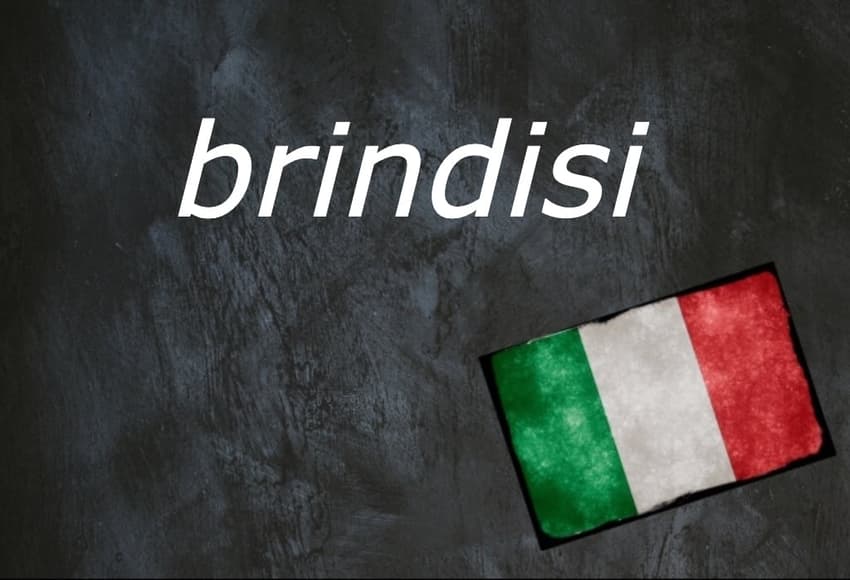Italian word of the day: ‘Brindisi’

Here’s a word to celebrate.
While in English we offer up a ‘toast’ on a special occasion, celebrations in Italy call for a brindisi.
The word is from the Spanish brindis, which according to the Treccani dictionary originally comes from the German bring dirs, meaning ‘bring thee’ (as in, I’ll ‘bring thee’ a drink, a speech, etc.).
The custom dates back to at least the ancient Greeks, with several references made in Homer’s Iliad and Odyssey to raising a glass in honour of a table companion. The Greeks are believed to have then brought it to ancient Rome, where it became a widespread practice.
The custom fell a bit out of use after the fall of the Roman Empire, but became popular again in Italy in the 16th century, when a brindisi usually involved reciting verses of poetry composed for the occasion.
Nowadays, a brindisi is in most cases just a simple toast, but locals don't say brindisi when clinking glasses, just as in English you wouldn’t exclaim ‘toast!’ to your drinking mates.
The Italian word for ‘cheers’ is cin cin (pronounced as 'chin chin').
This apparently comes from Chinese sailors saying qing, qing (please, please), when knocking cups, partly in playful imitation of the sound of clinking glasses.
The phrase was later exported to European ports and caught on so much in Italy that it became the country's most popular toasting salute.
In Italy, as in most of mainland Europe, it’s important to look all your friends in the eye as you clink glasses. Failure to do so is rumoured to invite bad luck.
A couple of alternatives to cin cin are salute ('to your good health'), cento di questi giorni ('may you have a hundred of these days') or even cento di questi anni or just cent’anni ('may you have a hundred years like this'), based on the assumption that the occasion calling for a toast makes it one of the best days of one's life.
Cin cin to that!
Do you have an Italian word you’d like us to feature? If so, please email us with your suggestion.
Comments
See Also
While in English we offer up a ‘toast’ on a special occasion, celebrations in Italy call for a brindisi.
The word is from the Spanish brindis, which according to the Treccani dictionary originally comes from the German bring dirs, meaning ‘bring thee’ (as in, I’ll ‘bring thee’ a drink, a speech, etc.).
The custom dates back to at least the ancient Greeks, with several references made in Homer’s Iliad and Odyssey to raising a glass in honour of a table companion. The Greeks are believed to have then brought it to ancient Rome, where it became a widespread practice.
The custom fell a bit out of use after the fall of the Roman Empire, but became popular again in Italy in the 16th century, when a brindisi usually involved reciting verses of poetry composed for the occasion.
Nowadays, a brindisi is in most cases just a simple toast, but locals don't say brindisi when clinking glasses, just as in English you wouldn’t exclaim ‘toast!’ to your drinking mates.
The Italian word for ‘cheers’ is cin cin (pronounced as 'chin chin').
This apparently comes from Chinese sailors saying qing, qing (please, please), when knocking cups, partly in playful imitation of the sound of clinking glasses.
The phrase was later exported to European ports and caught on so much in Italy that it became the country's most popular toasting salute.
In Italy, as in most of mainland Europe, it’s important to look all your friends in the eye as you clink glasses. Failure to do so is rumoured to invite bad luck.
A couple of alternatives to cin cin are salute ('to your good health'), cento di questi giorni ('may you have a hundred of these days') or even cento di questi anni or just cent’anni ('may you have a hundred years like this'), based on the assumption that the occasion calling for a toast makes it one of the best days of one's life.
Cin cin to that!
Do you have an Italian word you’d like us to feature? If so, please email us with your suggestion.

Join the conversation in our comments section below. Share your own views and experience and if you have a question or suggestion for our journalists then email us at [email protected].
Please keep comments civil, constructive and on topic – and make sure to read our terms of use before getting involved.
Please log in here to leave a comment.